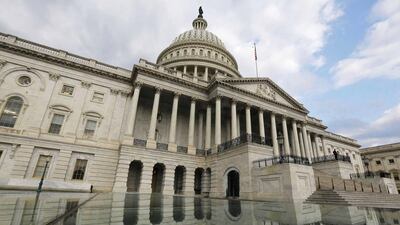The US Congress is considering legislation that would create a new bureaucracy within the Department of Homeland Security concerned with countering violent extremism.
According to the bill, the department will fund an office with powers to coordinate efforts against extremism. Because the programmes being proposed have already been found wanting, it might seem strange that the US has decided to double down on previous efforts. Unfortunately, the idea of adopting practices that have no empirical justification is par for the course in the US – especially when it comes to treating Arabs and Muslims as threats to security.
For a short time, the Clinton administration allowed subjective profiling of Arab passengers at airports. After 9/11, the Bush administration greatly expanded profiling. In 2010, the Obama administration issued an order that, for a time, required all passengers boarding flights from Arab and Muslim countries to be subjected to special scrutiny. They also introduced the “Spot” programme, which claimed to train security staff to be able to identify potential terrorists by using facial and behavioural recognition.
The net result of all these practices has been failure. No terrorists were caught or identified, but the impact on the affected communities was devastating. Arabs and Muslims were traumatised by their treatment and because these entire communities were singled out for special treatment, the government validated the suspicions of the public that Arabs and Muslims were, in fact, groups to be feared.
Like previous efforts, the new proposal argues that extremism is inspired by radical ideas that lead to violence. And so it directs law enforcement agencies to “seek out drivers and indicators of radicalisation”.
Already, government agencies are spending millions of dollars on programmes that target the American Muslim community in ways that compromise their basic rights. The FBI and local police departments have “mapped” Muslim neighbourhoods identifying places of worship, social clubs, restaurants and other popular businesses. In addition, there are paid informants operating in Muslim communities.
This proposal makes suspects of Muslim communities in an environment where they are already at risk of anti-Muslim sentiment. It also relies on facile studies that define “indicators” of radicalisation that are rather normal behaviours – like growing a beard, becoming religious or becoming “sullen or withdrawn” – and are not unique to young Muslims.
Because it assumes that ideas are the principal drivers of radicalisation, it asserts that the key to countering it lies in finding the “right message” and the “right messenger” to “defeat” the “bad ideas” at the root of the problem.
The reality is quite different. The problem of violent extremism in the US is significantly broader than the Muslim community and the root cause is not “bad ideas” but the social problems that make individuals prone to latch on to violent ideas. By focusing almost exclusively on Muslims, the new bill diverts attention from more serious social ills that pose greater threats to America’s security.
As several studies have demonstrated, America has a problem with violence that goes well beyond the Muslim community. For example, since the 2012 murders in Aurora, Colorado, there have been 78 mass killings in the US and only a handful of these were carried out by Muslims. Annually, there are more than 300 acts of “mass violence”, involving the use of guns. And since 2009, 63 “lone wolf” actions were carried out or stopped by law enforcement agencies. The majority of all of these involved non-Muslims. Most were inspired by an anti-government animus or race hate. And yet, there is no effort being designed to deal with these. Instead, law enforcement efforts and funding focuses almost exclusively on “Muslim” acts and actors.
Of the reported cases of so-called “Muslim terror” arrests since 9/11, 50 per cent have involved use of informants who, as court records make clear, actually led psychologically vulnerable individuals into criminal behaviour. For example, 30 per cent of the cases of “Muslim terrorism” that officials claimed to have stopped, involved individuals who were prodded to plan violent acts by the agencies that then arrested them. Reading the records of these cases shows that the targets were unstable individuals who were susceptible to informant encouragement.
In addition, there are those instances where young, alienated individuals have sought self-esteem or a thrill by fighting for a foreign cause – whether in Somalia or Syria or elsewhere. These are problems, to be sure, but the issue that should be addressed is why they became alienated and sought validation elsewhere. Again, this is not a uniquely Muslim problem.
What the proposed legislation tells us is that we need to focus on countering the radical messages that lead individuals into violent acts. In fact, attention should be focused on why these individuals become susceptible in the first place. When the radical messages are those that are fed by law enforcement informants, the entire argument takes on a different hue.
But the main question we should be exploring is why marginalised, alienated, socially dislocated and angry individuals seek out alternative identities or act out in antisocial ways – whatever form that radicalisation takes: anti-government, race hatred or religious-inspired violence. Providing these angry people with “good messages” will not meet their needs. Addressing the root causes of their alienation just might.
Targeting the Muslim community with this proposed legislation will not solve America’s broader problem of antisocial violence. And by targeting Muslims, the US risks creating more alienation among some young Muslims and laying the bait for hate crimes and discrimination.
James Zogby is the president of the Arab American Institute
On Twitter:@aaiusa


